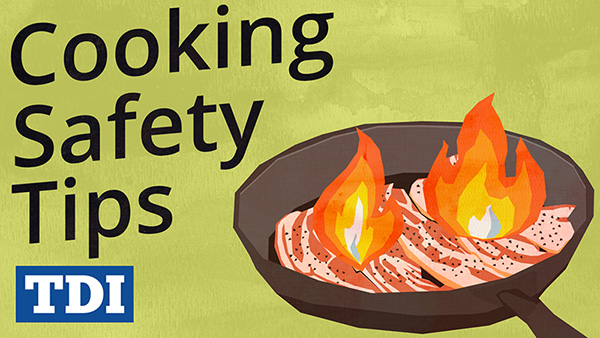
WATCH WHAT YOU HEAT
Cooking is the number one cause of home fires
PLAN A: PRIMARY PREVENTION
- The best time to cook is when you are wide awake, and
not drowsy from medications or alcohol. - Always wipe clean the stove, oven, exhaust fan to
prevent grease buildup. - Wear short or close-fitting sleeves when cooking.
- Keep a pan lid and dry potholders or oven mitts near
you EVERY time you cook. - Cook on the back burners of the stove when possible.
- Turn pot or pan handles toward the back of the stove.
- When heating food in the microwave, use microwavesafe cookware that allows steam to escape.
- Allow food to rest before removing from the microwave.
- When frying, use a pan lid or splash guard to prevent
grease splatter. - Stay in the kitchen while you are frying, grilling, or
broiling food. If you leave, turn off the stove. - If you are simmering, baking, roasting, or boiling food,
check it regularly. Remain in the home while food is
cooking, and use a timer to remind you to check on
your cooking. - After cooking, check the kitchen to make sure all
burners and other appliances are turned off.
WATCH WHAT YOU HEAT
Cooking is the number one cause of home fires
If your food does catch on fire…
1.Cover the pan with its lid. A cookie sheet works too.
Leave covered until the pan is cool. NEVER move the
pot or carry it outside – the pot is too hot to handle and
the contents may splash, causing a severe burn.
2.Turn the heat off. With the lid on and the heat off, the
fire should quickly put itself out. NEVER use water to
put out a kitchen fire. Water will cause the oil to splatter
and spread the fire, or scald you as it vaporizes.
3.If the fire is inside the oven or microwave, keep the door
shut and turn it off. Keep closed until the oven is cool.
4.If the fire gets out of control- get out, stay out and call
9-1-1. Don’t return inside for any reason.
STATS- 47% of all home fires are caused by cooking
- Adults >65 are at much higher risk of injury and death
from a kitchen fire due to physical, visual, hearing or
mental impairments that may slow the quick action
necessary in a fire emergency. - Thinner skin of older adults burn faster and deeper.
- Preventing a burn injury is always better than the pain
and trauma of medical treatment afterward.
Comments are closed